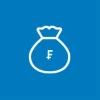A savings account can be used to hold money that you want to set aside. This could be your emergency fund, the money for your next tax bill, or savings towards big-ticket items like a computer or car. The bank pays you interest for the money in savings accounts. Savings accounts are not suitable for financial transactions, such as paying bills. There are limitations on withdrawals which vary between savings accounts, and you should pay careful attention to these.
You can find detailed tips in the moneyland.ch guide to savings accounts.
Which Swiss banks offer savings accounts?
Savings accounts are offered by all Swiss banks that provide services to private individuals. Many neobanks do not offer savings accounts, but they still have saving functions that are comparable with savings accounts. Depending on the neobank, these functions may be called savings pots, spaces, projects, or jars. You can find an overview of Swiss savings accounts in the interactive savings account comparison on moneyland.ch.
How do I open a savings account at my existing bank?
Opening a savings account at a bank at which you already have a private account is very simple. Normally all you have to do is send a request to your bank via online banking. The bank will then open your savings account. Only a few Swiss banks have online banking features that let you open a savings account directly in online banking on your own.
How can I open a savings account as a new customer?
You are considered a new customer if you do not already have an account at the specific bank. Each bank has its own process for opening new savings accounts. Typically, at least one of the following options will be available:
- Branch office: You can open a savings account by visiting a branch office of the bank in question. This is possible at nearly all banks, with the exception of direct banks and neobanks.
- Online: There are banks that let you open a savings account online. But opening savings accounts online is still not widely offered in Switzerland.
- Mail: Some banks let you open a savings account by mail. You simply contact the bank via its website, by email, or by phone, and tell them that you want to open a savings account. The bank then sends you an application form by mail.
Which documents do I need to provide when applying for a savings account?
Normally, showing your ID card or passport is sufficient. If you are not a Swiss citizen, the bank may ask to see your Swiss residence permit.
How do does the bank verify my identity as a new customer?
In order to open a savings account as a new customer, you have to prove your identity to the bank. In Switzerland, this is normally done in one of the following ways, although not all banks give you all of these options:
- Branch office: When you visit the bank’s branch office, the employees confirm your identity by checking your ID card or passport, and also your Swiss residence permit if necessary. Some banks also give you the option of verifying your identity at a branch office after you apply for an account online, if you are unable to use online verification.
- Online: A number of Swiss banks let you confirm your identity online. Some banks do this in their mobile app. Normally, you have to take a photograph of your ID, and then verify your identity by taking a self-portrait photograph or video, or having a video call with an employee.
- Mail: You receive forms by post which you then have to sign and send back to the bank. Swiss banks often require you to send a verified copy of your ID documents along with the forms. You can get a verified copy of your ID at the counters of SBB/CFF stations that have money changing services for 18 francs. You can also get one at any Swiss post office for 25 francs. Some municipal and cantonal government offices also offer this service.
Which banks let me open just a savings account as a new customer?
Many people want to open a savings account at a specific bank without having to also get a private account or bank package from the same bank. Dividing your savings between several different savings accounts, each at a different bank, is also a good financial move in some cases.
Table 1 shows which Swiss banks let you open a savings account without needing a private account at the same bank.
Table 1: Stand-alone savings accounts
| Bank |
Opening a savings account without a private account |
| Branch office |
Online |
By mail |
| Conventional banks |
| Aargauische Kantonalbank |
Possible |
Possible |
Possible |
| Appenzeller Kantonalbank |
Possible |
Not possible |
Not possible |
| Banca Stato |
Possible |
Possible |
No information |
| Bank BSU |
Possible |
Possible |
Not possible |
| Bank Cler |
Possible |
Not possible |
Possible |
| Banque Cantonale de Fribourg |
Possible |
Not possible |
Possible |
| Banque Cantonale de Genève |
Possible |
Possible |
No information |
| Banque Cantonale Neuchâteloise |
Possible |
Not possible 2 |
Possible |
| Banque Cantonale Vaudoise |
Possible |
Possible |
No information |
Basellandschaftliche
Kantonalbank |
Possible |
Only with a private account 1 |
No information |
| Basler Kantonalbank |
Possible |
Not possible |
Possible |
| Berner Kantonalbank |
Possible |
Only with a private account 1 |
No information |
| Glarner Kantonalbank |
Possible |
Not possible |
Possible |
| Graubündner Kantonalbank |
Possible |
Not possible |
Not possible |
| LLB |
Possible 1 |
Not possible 1 2 |
Not possible |
| Luzerner Kantonalbank |
Possible |
Possible |
Possible |
| Migros Bank |
Possible |
Possible |
Possible |
| Nidwaldner Kantonalbank |
Possible |
Possible |
Possible |
| Obwaldner Kantonalbank |
Possible |
Only with a private account 1 |
Possible |
| Postfinance |
Only with a bank package 3 |
Only with a bank package 3 |
Only with a bank
package 3 |
| Raiffeisen |
Possible |
Only with a private account 1 |
Not possible |
| Schwyzer Kantonalbank |
Possible |
Not possible 2 |
Possible |
| St. Galler Kantonalbank |
Possible |
Only with a Standard Set 4 |
No information |
| Thurgauer Kantonalbank |
Possible |
Possible |
Possible |
| UBS |
Possible |
Not possible |
No information |
| UBS Key4 |
Possible |
Only with a private account 1 |
No information |
| Urner Kantonalbank |
Possible |
Not possible |
Possible |
| Valiant |
Possible |
Possible |
Not possible |
| Zuger Kantonalbank |
Possible |
Possible |
No information |
| Zürcher Kantonalbank |
Possible |
Request |
No information |
| Neobanks |
| Coop Finance Plus |
Not possible |
Only with a private account 1 |
Not possible |
Kontomat
(Glarner Kantonalbank) |
Not possible |
Possible |
Not possible |
| wiLLBe (Tagesgeldkonto) |
Not possible |
Possible |
Not possible |
| Online bank |
| Cash - Banking by Bank Zweiplus |
Possible |
Not possible |
Possible |
| Swissquote |
Only in combination
with a private account5 |
Only in combination
with a private account5 |
Only in combination
with a private account5 |
1 A savings account can only be opened online in combination with a private account.
2 You can apply for a savings account online, but the account-opening process is done by mail.
3 You can open a savings account without a private account, but you have to get a bank package. You pay monthly fees for the bank package.
4 You can only open a savings account online in combination with a Standard Set (private account, debit card, online banking, and Twint).
5 You can only open a savings account in combination with a private account (formerly: trading account). You do not pay basic ongoing fees for the private account unless you hold securities.
Some banks only let you open a savings account without a private account if you visit a branch office or open the account by mail. You can identify these banks in the Online column by the footnote 2.
Do neobanks also offer savings accounts?
The well-known Swiss neobanks Neon, Yapeal, Yuh, and Zak do not offer savings accounts with their own account number.
But some neobanks do have features which perform a similar function to savings accounts from conventional banks. Neon lets you segregate money in Spaces and earn interest on it. Yuh had Projects that you can place money into, and Zak has saving pots. But with all three of these neobanks, the savings function is not a separate savings account, but simply a part of the private account.
How much do Swiss savings accounts cost?
It is widely believed that savings accounts are completely free. But even with savings accounts, there are fees that can apply.
- Basic account fees: Most banks do not charge basic account fees. But there are exceptions to this rule, as a few banks do charge a basic, ongoing account management fee.
- Transaction fees: When you transfer money from your savings account to your private account, you are normally charged a fee of five Swiss francs per transfer. The exception to this rule is when you move money from your savings account to your own private account at the same bank. Some banks even charge a fee when you move money from your savings account to your own household account.
- Early withdrawal penalties: If you fail to observe the required notice periods and limitations for withdrawals, you will be charged early withdrawal fees. This fee is normally equal to two percent of the amount that exceeds the limit for withdrawals.
- Account closure fees: Many banks charge you a fee when you close a savings account. The fee for closing a savings account can cost 25 francs. Often, you also pay fees to transfer the money as well. In many cases, it is cheaper to withdraw the money in cash at the counter.
Make sure to account for these fees when choosing a savings account. The most important factor to look at though is the interest rate. The savings account comparison on moneyland.ch shows you the fees and interest rates of savings accounts from many different Swiss banks.
Can anyone open a savings account?
The requirements for opening a Swiss savings accounts are relatively simple. If you live in Switzerland, you normally will not have any difficulty opening a savings account with a Swiss bank. But if you are a politically exposed person (PEP) or a citizen of certain countries, then it can be more difficult. That is the case, for example, with citizens of the United States of America, and people who hold a US green card.
Some banks will let you open a savings account even if you do not live in Switzerland, or if you are a cross-border worker, but you will normally have to visit a branch office in person. Make sure to check the bank’s fees for non-residents before opening an account.
More on this topic:
Compare savings accounts now
Compare bank packages now


 Deal of the Day
Deal of the Day 




